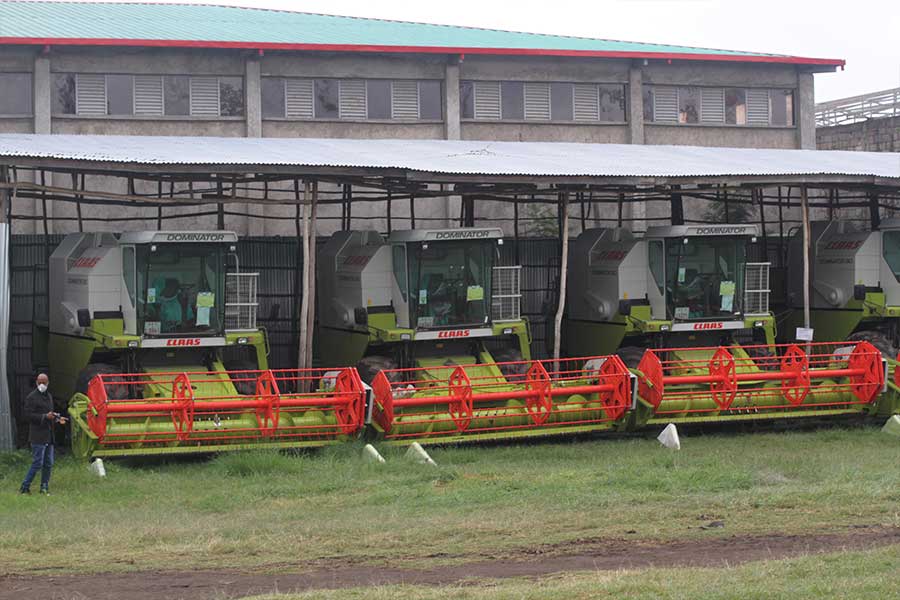
Advertorials | Dec 06,2023
Farmers in the outskirts of Addis Abeba have entered into contracts with federal authorities to supply grain to the state-run school feeding programme.
The programme was launched under the administration of Addis Abeba’s former Mayor, Takele Uma, in 2019 to boost enrollment and reduce absenteeism in public primary schools. It expanded to schools in the Oromia Special Zone near the capital the following year.
The school feeding programme has thus far benefited a little over 600,000 students in more than 1,000 public schools in the capital and the Oromia Special Zone. The federal government has appropriated two billion Birr for the new school year. Two hundred fifty women under the Agency are tasked with food preparation in the Oromia Special Zone. The programme employs 10,500 women.
Close to 4,200 smallholder farmers in six weredas of the Oromia Special Zone inked deals with officials of the Federal Cooperative Agency to supply 30,000tns of wheat and teff. The deals will enable the authorities to feed over 160,000 students this year.
“There were complaints about the supply of inputs,” said Ayalsew Workneh, director of communications at the Agency. “The latest initiative is in response to quality issues.”
Farmers are required to supply the grain over the next three months. They will be paid market prices at the time of delivery. Officials hope to see the latest arrangement with farmers foster the provision of “quality food” at relatively lower prices.
For Chala Adere, head of the Oromia Special Zone agricultural bureau, “the deals encourage a demand-driven farming system.”
Contract farming has been limited to a few agricultural commodities, such as oilseeds, sugarcane, and barley. Last month, the Council of Ministers approved a long-awaited bill governing contract farming before sending it to legislators. It aspires to enforce contracts, formalise the scheme, and allow institutional buyers such as agro-processors to source agricultural produce from millions of small-scale farmers.
The school meal programme can serve as a short-term response to the growing poverty level in urban areas, says Messay Mulugeta (PhD), a food security expert at the Addis Abeba University.
“Improving earning capacity should be given attention,” said Messay.
Over a quarter of the urban population lives below the poverty line. Arden Finn is an economist working for the World Bank; he co-authored a poverty assessment report for Ethiopia released two years ago. His findings include poverty in Ethiopia has fallen from 26pc in 2011 to 15pc five years later. However, a decrease in rural poverty was a marginal four percentage points from 30pc over the same period.
According to the report, the dominance of agriculture in the lives of poor people means that improvements in this sector will drive future poverty reduction.
Nevertheless, millions of households in urban areas are seeing their purchasing power steadily eroded by rampant inflation over the past five years. The pressure began picking up last August when headline inflation peaked above 30pc. It has not been abated, with each subsequent month registering similar figures.
The prices of agricultural produce are mounting just as quickly. Food inflation was recorded at 35.5pc last month. Cereals, including teff, wheat, and maise, exhibited the most significant price jumps.
A study investigating the nutritional quality and adequacy of school meals served to children found that the meals contributed suboptimal energy and nutrients to the students. Published on ScienceDirect, the study recommends including animal products, fruits and vegetables to boost their nutritional value.
Officials plan to expand the programme by entering into contract farming agreements with up to 50,000 farmers. Over 74,000 smallholder farmers farm 200,000hct of land in Oromia Special Zones. Regional administrators expect these farmers to harvest 7.8 million quintals of crops in this Mehir season.
Farmers in these areas are not new to the contract farming scheme. Close to 6,000 have been supplying barley to breweries such as Heineken.
Daniel Asfaw, 40, is among those who have agreed to supply wheat and teff to the Agency. The father of five grows the cereals on six hectares in Walmara Wereda. Last week, he signed a contract agreeing to supply 30qtl of teff and 45qtl of wheat. Daniel harvested 105qtl of grain last year, earning 5,200 Br for a quintal of teff.
“My income is no match for the rising prices for agricultural inputs,” he told Fortune.
Daniel spent 74,000 Br to buy agricultural inputs, including fertilisers.
PUBLISHED ON
Sep 18,2022 [ VOL
23 , NO
1168]

Advertorials | Dec 06,2023

Radar | Jun 11,2024

Featured | Aug 16,2020

Fortune News | Oct 03,2020

Commentaries | Sep 07,2019

Dec 22 , 2024 . By TIZITA SHEWAFERAW
Charged with transforming colossal state-owned enterprises into modern and competitiv...

Aug 18 , 2024 . By AKSAH ITALO
Although predictable Yonas Zerihun's job in the ride-hailing service is not immune to...

Jul 28 , 2024 . By TIZITA SHEWAFERAW
Unhabitual, perhaps too many, Samuel Gebreyohannes, 38, used to occasionally enjoy a couple of beers at breakfast. However, he recently swit...

Jul 13 , 2024 . By AKSAH ITALO
Investors who rely on tractors, trucks, and field vehicles for commuting, transporting commodities, and f...

Oct 11 , 2025
Ladislas Farago, a roving Associated Press (AP) correspondent, arrived in Ethiopia in...

Oct 4 , 2025
Eyob Tekalegn (PhD) had been in the Governor's chair for only weeks when, on Septembe...

Sep 27 , 2025
Four years into an experiment with “shock therapy” in education, the national moo...

Sep 20 , 2025
Getachew Reda's return to the national stage was always going to stir attention. Once...